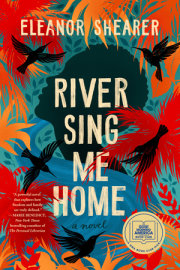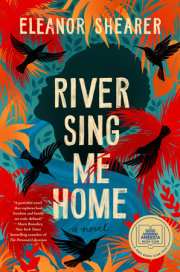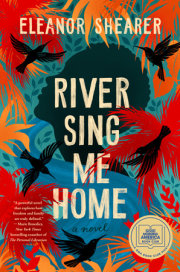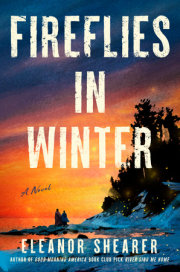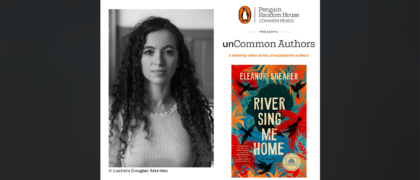The soil on the island was fertile, but everything laid down shallow roots. When the hurricanes came, they ripped up even the sturdiest trees; and when the white men came, they tore children out of their mothers' arms. And so, we learned to live without hope. For us, loss was the only thing that was certain.
Many of us had already lost one home. A home of deep roots and of ancestors delved down into history. Those roots did not save us. Those roots rotted in the hulls of the slave ships, in darkness and filth. We had little left to plant in the new world, and whatever we had was the white men's for the taking. So we tried to live only on the island's surface. We planted cane, but nothing of our own. Mothers turned their heads when a baby was born, refusing to meet its eyes.
We tried to glide through this half-life, this life without history or future, but our endless present had ways of stretching itself out, lying across time, until our lives had movement and color again. At night, we whispered stories to the children of old gods in our homelands, in a tongue the white men couldn't understand.
Still the hurricanes came. Still the children were taken away and sold across the sea. But they were sold with a little seed inside them that sang to them of another life.
Everything laid down shallow roots. But what couldn't go deep went wide, tapping the oceans, tunneling to the islands nearby, where others were also trying and failing to live without memory of yesterday or thought of tomorrow.
Without roots, things die. Many of us did die, at the hands of the white men or in the heat of the midday sun. The soil ran rich with our blood, and the roots fed on our bodies. It made the roots strong. Shallow, but strong.
There was hope for this new world, after all.
Barbados
August
1834
1
It was the blackest part of the night and Rachel was running. Branches tore at her skin. Birds, screeching, took flight at the pounding of her strides. The ground was muddy and uneven, slick with the residue of recent rains, and she slipped, falling hard against the rough bark of a palm tree. She slid down to the soil, to where ants marched and beetles scurried and unseen worms burrowed through the earth. With ragged breaths she gulped the heavy, humid air into her lungs. She could taste its dampness on her tongue, tinged with the acidic bite of her own fear.
What had she done?
She looked behind her. Looming in the darkness was the outline of the mill on Providence plantation, its arms splayed out like four sharp-edged daggers marking an angry cross into the sky. Terror clawed at her throat, as if the mill itself had eyes and could whisper to the overseer what it had seen.
It was not too late. She could still climb back over the wall and creep through the fields of half-planted cane, where gaping holes awaited young green stalks. She could return to her hut, one wooden square among many, and lie back on the sleeping mat that was worn thin from forty years of use. She could wait for dawn and another day of labor . . .
Scrambling to her feet, she kept running. Her legs plunged her deeper into the half-formed shadows of the forest.
Her chest ached. She wanted to collapse but could not; her body, unbidden, carried her farther and farther away from Providence. Every snap of a twig sounded like a gunshot; the murmuring of cane toads became the distant cries of searching men. She must keep running.
Alone, mud-streaked, with weariness sinking into her very bones, a question haunted her-
Was this freedom?
The empty forest. Her fleeing, sick with dread. Was this what they had hoped for, all along?
The day before, all the slaves of Providence had gathered outside the great house. A stone-faced set of white people waited for them-the master, on horseback, flanked by the overseer, with the master’s wife and three children standing on the steps of the house. The white people stared at the slaves. The slaves stared back.
They all knew what was coming. Some of the slaves even smiled. Rachel was among those who didn't. She was old enough to remember other times when there were whispers about the end of slavery. She would not believe it until she heard it for herself from the master's own mouth.
The master's balding forehead glistened with sweat in the heat. As he brought his horse forward, Rachel caught a glimpse of his wife's face, her lips pressed into a line of seething contempt. It was this sight, more than anything, that weakened Rachel's resolve. She dared to hope.
The master kept his remarks short. He told them that the king had decreed an end to slavery. As of the following day, the new Emancipation Act would come into effect.
They were free.
Some people cried. Others yelled and danced in delight. They were a mass of shouting, sweating bodies, a river bursting its banks. The master and the overseer barked useless orders, unable to be heard over the noise. Eventually, the master rode his horse through the crowd at a gallop, just to get them quiet again. Its hooves kicked one woman's head in, and she died instantly. But she died free.
There was more, the master said. They were no longer slaves, but they were instead his apprentices. By law, they would work for him for six years. They could not leave. When the sun rose, Rachel and all the rest would be going back out to finish the planting. They would tend to the cane until the next harvest, and the harvest after. Six years of cutting and planting and cutting again.
Freedom was just another name for the life they had always lived.
An ugly hiss went through the crowd. The overseer, gun slung over his shoulder, reached to bring it down. A hundred pairs of eyes watched the arc of his hand. The master's horse blew air through its nostrils, its reins pulled taut.
The hiss died, and the crowd was still.
Rachel heard the news of hollow freedom in silence. For years, she had lived in perpetual twilight. Those she loved were long gone. Her life had shrunk to the size of the plantation, the routine of endless toil and the long shadows of what had once been. So, there was sense to it. Freedom was an emptiness that could only be filled with sugarcane.
That night, everything was the same. The press of the ground on her back. The shape of her limbs, thin and knotted with sinew. The musty smell of her hut. Days of labor lay ahead, her life as neatly plowed as the furrows in the field.
In sleep, she dreamed of her mother. Or maybe it was the idea of a mother, an outline of warmth and kindness. She couldn't remember her own mother.
The mother was there in front of her, but somehow Rachel knew that she was also not there. She was somewhere far across the sea. She was fragile, a wisp of smoke. She could not stay long.
The mother spoke a name, and Rachel knew that it was her name-the name she was meant to have before some white man called her Rachel. What the white man gave, he could always take away. But this other name-this was hers. Rachel repeated it. The syllables felt strange in her mouth, but as the thrum of speech vibrated through her, they gave her strength. She was able to stand without stooping. She could feel the pleasant weight of her body, solid and powerful.
The mother stepped back and began to dissolve, one drop at a time, soaking the earth underneath her. When she was gone, the soil glistened a deep, rich red.
Rachel had awoken in pitch darkness-wild, trembling and glistening with sweat-and her body could not be stilled. It moved without her asking it to; it moved on animal instinct alone, crawling out of the hut, unfurling and flinging itself out of Providence and into the night.
In the forest, Rachel asked herself again: Was this freedom? A violent rupture, a body driven to flight, a mind paralyzed with horror as it watched things unfold beyond its control?
The trees had no answer. Their leaves whispered in the wind, and Rachel imagined them taunting her-
What now?
Her body moved beyond the range of thought, with a desperate will of its own.
She kept running.
She had no way to mark the passing of time on that moonless night, but by the burning in her legs Rachel knew she had traveled an hour or more when she heard it. So faint she thought she was imagining it at first. Singing.
She saw a speck of light, flickering between the tree trunks. She advanced slowly, her mind filled with thoughts of ghosts and nighttime spirits. But as the singing swelled, accompanied by drumming, filling the forest with sound, her fears receded. The noises were joyful and human and drew her in.
A clearing. A tight circle of bare earth in between the trees. At its center, dozens of people were dancing round a crackling fire, with still more lingering at the edge. As the dancers spun past, Rachel heard snatches of different words and melodies all blending into one. She heard some English, but also other languages, older languages that spoke not to her ears but to her bones.
Rachel stood in shadow, watching. She had been to dances before, as a younger woman, but not like this. Those dances had always been folded into plantation life. They took place in the slave quarters, or in the market square of a nearby town. At any time, a white passerby could appear, or the face of the master in a window of the great house, reminding all present that their joy was not boundless; it could not overflow the confines of slavery. The clearing sparkled with a different kind of magic. With no prying eyes to break the spell, the dancers moved with an unencumbered grace.
The insistent pull of the drums drew Rachel closer, closer, into the light. She found herself one body among many, swaying in time to the beat. She began to tap her foot and hum a song of her own.
A woman threw out her arm, her eyes wide and white, with glittering circles of firelight at the center. She seized Rachel by the wrist.
She sang the command, her voice low and sweet. "Dance!"
Rachel was swept into the throng. In an instant, she lost all sense of herself. She had no end and no beginning, no edges or limits at all. Her whole body dissolved into the rhythm. The dance rippled through the crowd as if through water, and Rachel gave herself up to the music.
Every ache in her body eased. She emptied her lungs of a song she had not even known was inside her. Someone was holding Rachel's hand; she reached out and grabbed another's hand, who grabbed another's hand. As the flames leaped into the sky, Rachel thought she could see the chain of hands climbing to the heavens, a line of people through time and space, united by a single drumbeat.
As the last embers of the fire died, everyone stopped dancing. The dawn was beginning to break, gray light leaking through the trees, and the rising sun brought an end to whatever magic had bound them together. People began to leave, most of them tacking west, the sun on their backs, returning to their plantations. Hovering at the edge of the clearing, standing between two broad oaks, Rachel wondered momentarily if she should follow them. Her absence on Providence might not yet have been noticed. But she hesitated too long. Soon, everyone was gone and she was alone. She slipped eastward, back into the forest.
All of the running and the dancing weighed her down. She ached everywhere. It forced a slow pace. The terror of the first flight had faded to a kind of daze, and she stared up through the canopy at the sky. Somehow, the darkness had been easier-it had a kernel of mystery to it, a sense that the night held many possible worlds, their boundaries worn thin, so that anyone may pass between them. Sunlight was a reminder of the endless march of one day into the next, the unstoppable passage of time to which Rachel had been enslaved all her life.
Still the question plagued her-
What now?
It had a weary edge, a hopelessness. Her run from Providence had been pure survival. Now, she wandered aimlessly through the undergrowth; there was no path, and she stumbled over exposed roots. Her head throbbed with thirst and her limbs were heavy, but her body kept carrying her forward, away from Providence. Apart from the soft thud of her feet on the bare earth, the only sounds were the chattering grackles that flitted overhead.
She climbed the gentle slope of a hill. When she reached the top, suddenly there was the sea. The sight of it spread out below stopped Rachel in her tracks. She had reached the limits of the island.
The rising sun dipped its lower rays into the water on the horizon. Against the gray sky, the sea was a shocking shade of blue, dappled with white-gold sunlight. Its burst of color cut loose the fear that had wrapped itself around Rachel's throat the night before. As if she had plunged into the gently rolling waves, she felt at peace.
All her life, nothing had belonged to her, not even the children pushed out of her own body. With her world boxed in by Providence's walls, and its perimeter patrolled by the overseer's whip, it had seemed as if there was nothing the white men did not own. But now, here was the sea. Vast, defiant and unowned, for who, even white men, could claim it? However much they grasped at it, its waters would run through their fingers and plunge back into the depths.
At the plantation, Rachel had always been made to feel small. With the sea spread out in front of her, she felt small in a different way-not small in herself but a small part of everything that surrounded her. Immersed in the infinite sea. There was freedom in this new kind of smallness, an exhilarating sense that she was in the world, and not just passing through it at a white man's pace.
The question came to mind once again-
What now?
This time it had a new quality-it looked forward, outward, across the water. Not back over her shoulder to anyone who might be pursuing her.
Copyright © 2023 by Eleanor Shearer. All rights reserved. No part of this excerpt may be reproduced or reprinted without permission in writing from the publisher.



